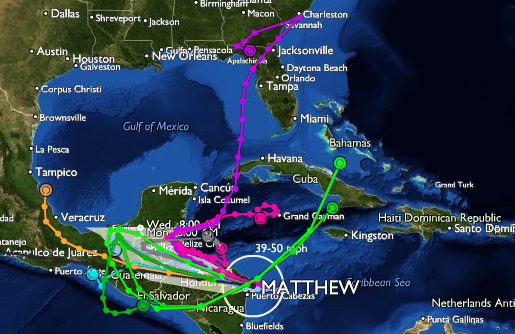By Makini Brice
LES CAYES, Haiti, Oct 3 (Reuters) – Hurricane Matthew bore down on Haiti on Monday, where towns and villages braced for “catastrophic” floods and mudslides that forecasters fear will be triggered by 140 mile-per-hour (220 kph) winds and up to 3 feet of rain over its denuded hills.
Winds and rain began picking up in the southwest of the Caribbean country, but the center of Matthew, a violent Category 4 storm, is not due until late on Monday night, the U.S. National Hurricane Center said.
It is now forecast to reach the Bahamas on Tuesday and possibly reach Florida by Thursday as a major hurricane, though weaker than at present, the U.S. National Hurricane Center said. Before that, it will hit Cuba.
“It has the potential of being catastrophic,” said Dennis Feltgen, a meteorologist and spokesman for the Miami-based hurricane center, when asked about Matthew’s expected impact on Haiti.
Authorities were ferrying 3,000 people off Ile-a-Vache, a low-lying island off Haiti’s southwest coast, by helicopter, Haitian Foreign Minister Pierrot Delienne said. Interior Minister Francois Anick Joseph said 30,000 people were in areas of risk who should be moved before the storm hits
However, in Haiti’s largest slum, the seaside Cite Soleil in capital Port-au-Prince, Mayor Frederic Hislain said 150,000 people whose homes he said were threatened needed to be bussed to safer places.
“Those people are living all along the seashore in a bunch of huts which usually can’t even really protect them from ordinary rain. Now we are talking about a strong hurricane. Imagine the disaster we may have to face here.”
Alta Jean-Baptiste, head of the Haiti’s Department of Civil Protection, said one man was killed by large waves at sea over the weekend, and another went missing when his boat capsized, despite warnings to stay on dry land.
Many people are reluctant to leave their homes due to fears their belongings will be stolen and by Monday evening only about 2,000 from the south were in shelters, officials said. However, more have moved from precarious homes into relatives’ houses.
Matthew, one of the most powerful Atlantic hurricanes in recent history, was about 120 miles (193 km) south of westernmost Haiti at 8 p.m. EDT (0000 GMT) on Monday, the U.S. hurricane center said.
It is expected to bring between 15 and 40 inches (38 to 101 cm) of rain to parts of Haiti and the Dominican Republic.
Crawling north at about 8 miles (13 kph), the storm threatens to linger enough for its winds and rain to cause great damage. Haiti is prone to flash floods and mudslides because most of its hillsides have been stripped bare by people cutting down trees to make charcoal to sell for fuel.
HEAVY RAIN
Heavy rain fell over Haiti’s southwestern coastal city of Les Cayes, which lies near Matthew’s predicted path. Some residents of homes made of scrap metal and zinc sheets, perched just feet away from the ocean, refused to move into government shelters ahead of dangerous predicted storm surges.
A few miles to the west, wind buffeted the town of Tiburon, said Nicole Francois, of Haiti’s National Center of Meteorology.
About 150 people huddled without electricity or food in Les Cayes’ largest shelter, a school meant to house 600.
“After the hurricane, we will be miserable. We’ll be hungry… The houses will be destroyed,” said Rosette Joseph, 44, at the shelter with her four children.
The storm comes at a bad time for Haiti. The poorest country in the Americas is set to hold a long-delayed presidential election on Sunday.
In both Jamaica and Haiti, authorities shut the main airports to wait for the storm to pass.
In Cuba, where the storm is due to hit on Tuesday, evacuation operations were well underway with most tourists in the eastern town of Santiago de Cuba moved inland and given instructions on where to shelter in hotels during the hurricane. (Additional reporting by Joseph Guyler Delva in Port-au-Prince, Sarah Marsh in Cuba and Gabriel Stargardter in Jamaica Writing by Frank Jack Daniel and Gabriel Stargardter; Editing by Tom Brown and Bill Rigby)
